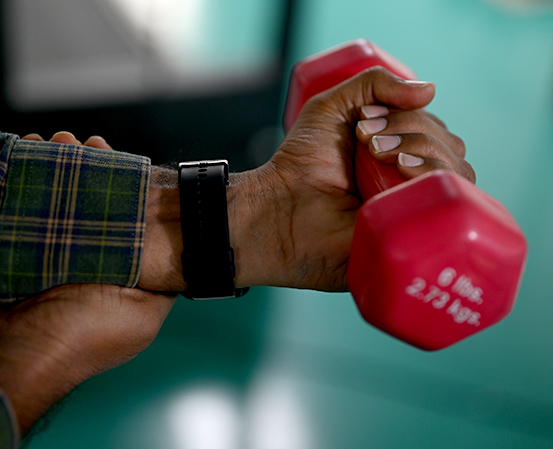
For over six years, 32-year-old Rohan Dey (name changed) had a sharp pain in the back of his head. The pain, on the left side, was sharp and shooting. It caused him trauma and he was unable to live a normal life ever since this happened.
Dey got temporary relief from prescribed anticonvulsants, painkillers and physiotherapy in phases, but the debilitating pain refused to go away. It was only after he was diagnosed with occipital neuralgia, a neuropathic pain disorder with distinctive diagnostic and therapeutic challenges, that his treatment started. Many pain physicians and neurologists consider this a non-existent condition that merely represents a variant of cervicogenic headache emanating from C1 to C4 nerve roots.
“This usually happens to people who either work on computers for long hours as Dey did or those who paint ceilings. My team treated his condition by blocking the nerve that was causing pain. This technique involves the greater occipital nerve (GON) block in the treatment of occipital neuralgia,” says Dr Vikas Tyagi, a pain management specialist from Noida Pain Management Clinic.
ALSO READ
Shoulder impingement syndrome: test soon and treat early
Back pain? We’ve got your back
How to manage pain during psoriasis flare-ups
That pain in your chest may not be a heart attack
Dr Tyagi along with other pain management specialists – Dr Dhruv Bibra and Dr G P Dureja – published a study on occipital neuralgia in the Indian Journal of Pain.
Chronic pain versus acute pain
Chronic pain can stem from various causes and sometimes, there is not much one can do about it. The pain could also lead to depression, anxiety and insomnia.
Acute pain is a condition that happens when one gets hurt; it can heal and post medication, the pain is as good as forgotten. Chronic pain is a different ball game altogether. It continues long after one recovers from an injury or illness and there are times when the condition is undiagnosed too. Unlike acute pain (a symptom), chronic pain is itself a disease and its management must incorporate its social and psychological aspects, apart from the physical ones, for better outcomes.
Types of chronic pain
The World Health Organisation has divided chronic pain into seven categories. They are:
- Chronic primary pain (eg: fibromyalgia, irritable bowel syndrome)
- Chronic cancer pain (caused by cancer or cancer treatment)
- Chronic post-surgical or post-traumatic pain (persisting for longer than three months after tissue damage)
- Chronic neuropathic pain (caused by nervous system lesion/disease)
- Chronic headache and orofacial pain (idiopathic or symptomatic)
- Chronic visceral pain (caused by inflammation, ischemia, thrombosis, distension, obstruction, compression around internal organs)
- Chronic musculoskeletal pain (pain arising from bones, muscles, joints and related soft tissues)
The most common types of chronic pain are headaches (including migraines), arthritis or joint pain, neck or back pain, cancer pain, muscle pain, testicular pain (orchialgia), muscle pain all over (such as with fibromyalgia, lasting pain in scar tissue, neurogenic pain from damage to the nerves or other parts of the nervous system.)
Diagnosis, tests and treatments
Who’s at risk? It can include those with a family history (such as migraines), previous injuries, physically strenuous jobs and older people. Stress and smoking can also be factors.
“There has been a remarkable change in the treatments for chronic pain in the last few decades. Therapies like PRP (platelet-rich plasma), prolotherapy and occipital nerve block provide safe and effective treatment options for painful conditions like ligament tear, frozen shoulder, fibromyalgia and neck pain. In fact, the pain could be managed without any surgery and at a fraction of cost by interventional pain specialists,” explains Dr Tyagi.
Someone with long-lasting pain would need to see a pain management specialist who will gather all information required, including medical history, to treat the condition effectively.
Certain tests will be recommended like routine blood tests, electromyography to test muscle activity, imaging tests such as X-rays and MRI, reflex and balance tests, spinal fluid tests, urine tests and nerve conduction studies to see if the nerves are reacting properly.
The treatments can include using anticonvulsants (medications that prevent seizures) for nerve pain, antidepressants, corticosteroid, muscle relaxers, nonsteroidal anti-inflammatory drugs (NSAIDs), acetaminophen, topical products (applied to the skin) and sometimes in extreme cases, even opioids (narcotics). Since opioids can be addictive, they are used only when all other options are exhausted.
There could also be the usage of transcutaneous electrical nerve stimulation (TENS), nerve blocks and epidural steroid injections.
According to Dr Pallavi Aga, MD, nutritionist and lifestyle consultant, Mind, Body and Wellness Clinic, Noida, “a lot of women suffer from chronic pelvic pain post the age of 30 and higher up as they advance towards menopause. Therapies like yoga, exercises to strengthen the pelvic muscles and taking supplements can provide them with the much-needed relief.”
She says that with age, there could be pelvic congestion; associated lower back pain; weak bones, muscles, ligaments and issues in the uterus or the ovaries – so strengthening the pelvis is very crucial.
“Deep breathing techniques that are also part of yoga asanas can really help in alleviating the pain. Avoiding refined oils, taking supplements like vitamin D, zinc, magnesium glycinate, drops of ashwagandha (withania somnifera), a daily tablespoon of ghee and getting your daily walk in the sun can also help. Usually, chronic pelvic pain arises out of deficiencies due to depleting sources of vitamin D or Vitamins B1, B6, B 12, protein and collagen,” adds Dr Aga.
Other methods to relieve chronic pain can include cognitive-behavioural therapy that teaches altering thinking methods to help cope with pain, counselling in matters of psychogenic pain, occupational therapy that teaches different ways to do activities of daily living to lessen pain, acupuncture, aromatherapy, biofeedback, hypnotherapy, mindfulness training, music, art or pet therapy, reiki, massage and meditation.

















